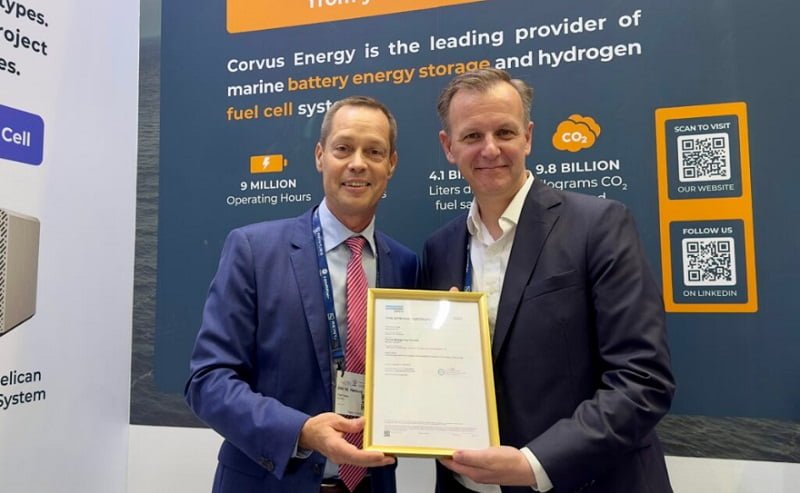Corvus Energy, a leading supplier of energy storage systems (ESS) for maritime, offshore, and port applications, is thrilled to announce that its innovative Corvus Pelican Fuel Cell System has received Type Approval from DNV, a leading maritime classification society. This approval marks a significant advancement in marine fuel cell technology, as the Pelican Fuel Cell System is the first of its kind to be inherently gas-safe, positioning it as the safest option available in the market.
The Corvus Pelican Fuel Cell System was developed through the three-year H2NOR project, reflecting a commitment to safety and performance. This system is specifically designed with a nitrogen-based inerting technology for the fuel cell space, setting a new standard in safety and efficiency.
Olaf Drews, Head of Engines & Pressurized Equipment Maritime at Corvus Energy, highlighted the groundbreaking nature of this technology: “It is a special fuel cell system because the Pelican uses nitrogen for inerting of the fuel cell space. It is the first fuel cell system that uses this technology, and this brings it to a very preferred safety level. This is a milestone, and we look forward to the first ship project.”
The Type Approval from DNV confirms that the Corvus Pelican Fuel Cell System adheres to the rigorous performance and safety standards required by the maritime industry. This endorsement is a pivotal step towards achieving Net Zero shipping. Despite advances in battery electric vessels, many vessels still struggle to achieve zero-emission operations for extended periods using batteries alone. The integration of clean fuel and fuel cells is essential for vessels on longer routes or those with infrequent charging opportunities, making the Corvus Pelican a crucial component in extending zero-emission capabilities.
Fredrik Witte, CEO of Corvus Energy, emphasized the project’s success factors “Toyota’s unsurpassed knowledge in developing high-quality and efficient fuel cells, combined with the strong collaboration and high level of maritime experience among the partners in this development project, has been key. This is a milestone for net zero shipping. We now have a high-quality range extender to add to our existing ESS portfolio with the scalability and the safety needed to be a real driver in the future of marine decarbonization.”
The Corvus Pelican Fuel Cell System incorporates a Proton Exchange Membrane (PEM) fuel cell module from Toyota, a technology proven in over 30,000 vehicles worldwide. Thiebault Paquet, Vice President of Toyota Hydrogen Factory Europe, commented on the Type Approval “DNV Type Approval demonstrates that Toyota fuel cell technology is transferable to the marine sector and is a viable solution to support maritime decarbonization efforts.”
The Corvus Pelican Fuel Cell System combines proven fuel cell technology with a maritime-specific design, streamlining its integration with ship systems. To further enhance energy efficiency, Corvus is developing Corvus CoPilot – a real-time advisory system designed for shipowners to optimize power distribution, improve performance, and extend system lifetime. Corvus CoPilot is supported by Corvus Energy’s robust digital solutions for energy storage, including remote performance monitoring, troubleshooting, and State of Health Testing.
The first Corvus Pelican Fuel Cell System is ready for installation onboard “MS Skulebas,” a 35-meter fishing and training vessel owned by Vestland County and operated by Måløy Upper Secondary School in Norway. The vessel, which already features a 1 MWh battery system, will be upgraded with the Corvus Pelican Fuel Cell System and hydrogen storage, enabling it to operate zero-emission for up to four days.
About Corvus Energy
Corvus Energy is a leading supplier of energy storage systems (ESS) for maritime, offshore, and port applications. The company offers a comprehensive portfolio of energy storage and fuel cell systems tailored to various vessel types, including modular lithium-ion battery systems and Hydrogen PEM fuel cell systems. With over 1200 projects and more than 50% of the world’s zero-emission vessels equipped with Corvus Energy systems, the company is at the forefront of advancing marine decarbonization efforts.
Source Corvus Energy

